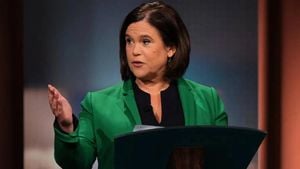Prabowo Subianto’s early presidency has quickly unfolded against the backdrop of ambitious economic initiatives and diplomatic outreach. Just over a month since assuming office, the newly minted president is setting the tone for his administration with high-profile meetings and legislative proposals aimed at reinforcing Indonesia’s status on the global stage. The stakes are high as Prabowo looks to stimulate the economy and tackle domestic issues, including nutrition and corruption, promising to reshape his country with both speed and efficiency.
On December 3, 2024, President Prabowo Subianto hosted an engaging brunch at the State Palace for more than fifty prominent American entrepreneurs, many of whom are affiliated with the U.S.-ASEAN Business Council. This gathering stands as part of Prabowo's larger strategy to cultivate stronger economic ties with the U.S. and attract American investments to Indonesia. Dressed smartly in grey and blue, Prabowo made it clear to his guests, "I would like to welcome all of you to Indonesia," reflecting his commitment to fostering amicable diplomatic relations.
During his welcoming remarks, Prabowo highlighted the rapid progress of his administration since taking office just 44 days prior. "Many of our commitments have been fulfilled," he stated, as he expressed gratitude toward his cabinet. From discussions about simplifying the business environment to addressing issues of corruption — which he referred to as "cancer" to the economy — Prabowo left no doubt about his intentions to establish Indonesia as more business-friendly and transparent.
Prabowo's determination to combat corruption was evident throughout his discussions, openly insisting on zero tolerance for corrupt practices. He reassured entrepreneurs saying they had direct channels to report any misconduct, encouraging them to feel secure investing and operating within Indonesian borders. Minister of Investment Rosan P. Roeslani underscored the importance of this message, noting it was well-received and indicative of Prabowo's commitment to transparency.
A focal point of the administration has also been Prabowo's flagship initiative — the free nutritious meal program aimed at combating stunting and malnutrition among schoolchildren and pregnant women. It is ambitious yet fraught with challenges. At the heart of this program is the decision to set the per meal budget at Rp 10,000 (approximately $0.63), reduced from Rp 15,000 due to fiscal constraints.
During press interactions, Prabowo defended the budget decision, explaining the necessity of budgetary prudence. "We want to set the price to Rp 15,000 per serving, but the fiscal condition accommodates only Rp 10,000. We believe this is enough to deliver quality meals and nutrition," he affirmed. The government aims to deliver nutritious meals to about 82.9 million individuals, which would surely require optimized logistics and efficiency.
Meanwhile, Coordinators including the Social Empowerment Minister Muhaimin Iskandar echoed Prabowo's sentiments, articulately stressing the need for quality control within the new budget constraints. Past achievements, including positive pilot initiatives across Java, were mentioned to bolster reassurance about the program’s feasibility. While concerns loom over whether the administration can manage the complexity of logistics for this massive rollout, Prabowo’s administration remains optimistic about both economic and public health benefits.
Not one to shy away from intersectional challenges, the president recently directed his Cabinet to fortify Indonesia’s aviation sector, especially with impending fare reductions during holiday seasons. He highlighted the importance of maintaining economic health within the sector, urging ministers to collaborate effectively to cater to safety and security associated with the year-end travel rush.
Prabowo's call for unity among ministers demonstrates his approach to governance—an emphasis on cross-departmental cooperation to translate policies effectively. His directive for preparation involved multiple Cabinet members responsible for transport, infrastructure, tourism, and public works, aiming to leverage the holidays as economic momentum.
Throughout these early weeks, Prabowo has consistently emphasized the necessity of swift action and tangible results from his ministers. From pushing for food self-sufficiency, establishing service units for free meals, to ensuring effective partnerships with U.S. businesses, his proactive leadership style is reflective of both urgency and dedication to meeting promises made to the Indonesian people.
Beyond immediate economic strategies, there remains attention to Indonesia’s standing on foreign platforms. Prabowo has made significant moves including maintaining sound bilateral relations, striving for fruitful outcomes from recent dialogues, and capturing new opportunities for investments.
This month alone, expectations for substantial investments from tech giants like Apple and energy commitments from other multinational corporations hint at Prabowo’s successful outreach efforts. On multiple occasions, he has expressed confidence in the ability of Indonesia to cease rice imports by 2025, indicating fundamental shifts within agricultural productivity and self-sufficiency.
Engaging with the ASEAN countries, Prabowo has also sought to address broader regional stability, launching initiatives aimed at uplifting Indonesia’s influence and capacity within Southeast Asia's political and economic fabric.
To conclude, Prabowo’s administration seems to be embarking on a practical yet ambitious agenda aimed at enhancing Indonesia's global relationships, domestic prosperity, and social welfare for its citizens. By hosting brunches for high-profile entrepreneurs, initiating transformative health programs, securing investments, and directing his cabinet toward sectorial resilience, he is crafting the narrative of his early presidency with both engaged leadership and determined goals.



